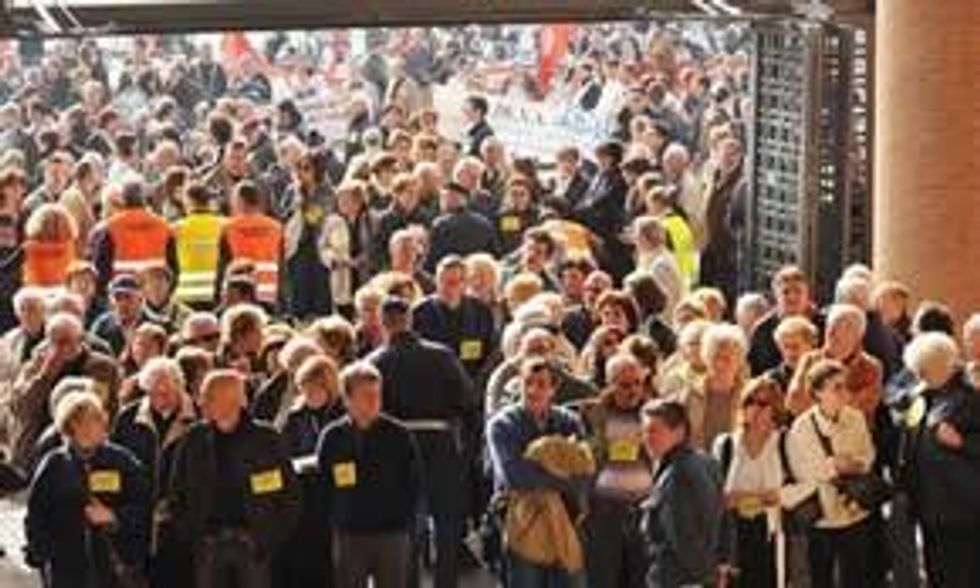It's been twelve long years since a criminal investigation was first opened against Stephan Schmidheiny.
Schmidheiny is one of the wealthiest men in Europe.
And he was a majority owner of Eternit, at the time one of the world's largest asbestos companies.
Now, in a courtroom in Turin, a criminal negligence trial of Schmidheiny and another Eternit owner is about to enter its third year - and its final phase.
Barry Castleman is one of the world's leading experts on asbestos disease.
And last year, he flew to Italy to testify on behalf of the prosecution.
"It is estimated that 3,000 people have died from asbestos related disease and as a consequence of Eternit's activities," Castleman said in an interview with Corporate Crime Reporter last week. "This includes Italians who worked in the Eternit plant in Switzerland."
"In Italy, they actually investigate death on the job as a crime," Castleman said. "And in a number of cases, they actually prosecute corporate management. There was the Seveso disaster in 1976. There were workers who were handling dye intermediates - 132 of them died from bladder cancer from handling notorious dye intermediates. Plant owners, managers, even the company doctor were jailed for terms of 3-6 years in the 1970s."
"This current asbestos case that I was asked to testify in, in Turin, is unique in that the defendants are the owners and top management, the foreign people who were most responsible for bringing this problem to Italy and not exercising reasonable protective measures in the 1970s and 1980s."
"The Eternit company was a multinational operation with subsidiaries all over Europe and South America and South Africa. They made asbestos cement products."
The prosecutor is famous for bringing these kinds of cases, Castleman says.
His name is Rafaele Guariniello.
"The case is being heard by three judges," Castleman says. "The case is being held in an auditorium in the justice ministry in Turin. The auditorium is filled with lawyers representing civil parties. Media sometimes show up."
Why is the trial taking so long?
"The judges only hold court one day a week," Castleman said. "When I was testifying there, I had to wait from one Monday to the next to continue. I told people I was a tourist in Turin who testified as an expert witness between 9:30 and 2:30 on Mondays."
"I testified on two Mondays. The first time I had a horrible translator. The translator was having evident difficulty translating simple things I was saying. The newspapers even criticized the judges for not getting a better translator."
"On the second Monday they got a great translator and everything went fine. And between Mondays, I wrote a three-and-a-half-page summary and had that translated and presented it to the judges the second Monday."
"My role was to place the Eternit story in a global context. I introduced a letter from the Schmidheiny group to the Dutch subsidiary in 1950, listing articles on asbestosis. I showed how the industry went through an intense period of international collaboration between 1969-1971, as the industry was fighting media coverage, union pressures and government regulation in the US, the UK, and the Netherlands -- but not Italy and Belgium, the document says. Documents from 1978 and 1980 show the top Eternit manager in Belgium opposing the shipment to Europe of asbestos packages with even mild health warning labels. I contrasted Eternit's failure to put warning labels on its asbestos products through the 1980s with the US, where product liability and 1972 OSHA rules focused the industry's attention on warning labeling much earlier."
Does Castleman believe that there will be a conviction?
"Yes," Castleman said. "I believe there will be convictions. I am following the Italian press. The translator and I became friends. And she sends me translations of the articles appearing in the press and keeps in touch with people who are involved."
"A reporter for La Stampa is very good. Her name is Silvana Mossano."
What makes you think the judges will convict?
"Stephan Schmidheiny's lawyers, in giving closing argument, are asking for the trial to be removed to another court," Castleman said. "That sounds to be a ridiculous thing to be doing nearly two years into the trial. No excuses that he didn't know asbestos was deadly or thought the plant managers were taking care of protecting the workers. Waxing indignant, Schmidheiny's lawyer ridiculed the 'sacrosanct' principle of rehabilitation through punishment for things done 25 years ago when 'a person' is not the same as he now is. The lawyer suggested that Schmidheiny's philanthropy should take precedence over how his fortune was made. The lawyer's rambling about the erosion of principle of law in Italian courts compared the persecution of Schmidheiny to acts of the Nazis and Guantanamo. Schmidheiny's lawyer also claimed that the diagnostic methods used in some of the victims' mesothelioma cases did not employ state-of-the-art techniques."
Did the defendants ever appear in their own defense?
"They have never shown up. They only have their lawyers there."
Could they get extradited?
"That will be up to the courts in the countries where the defendants live, I suppose," Castleman said. "They have the right to appeal and their odds improve as they appeal to the two higher courts."
"They don't have to go to jail until they have exhausted their appeals."
Do they have enough money to appeal?
"Stephan Schmidheiny has been estimated by Forbes to be worth $2.8 billion," Castleman said.
[For the complete transcript of the Interview with Barry Castleman, see 25 Corporate Crime Reporter 45(11), November 21, 2011, print edition only.]
